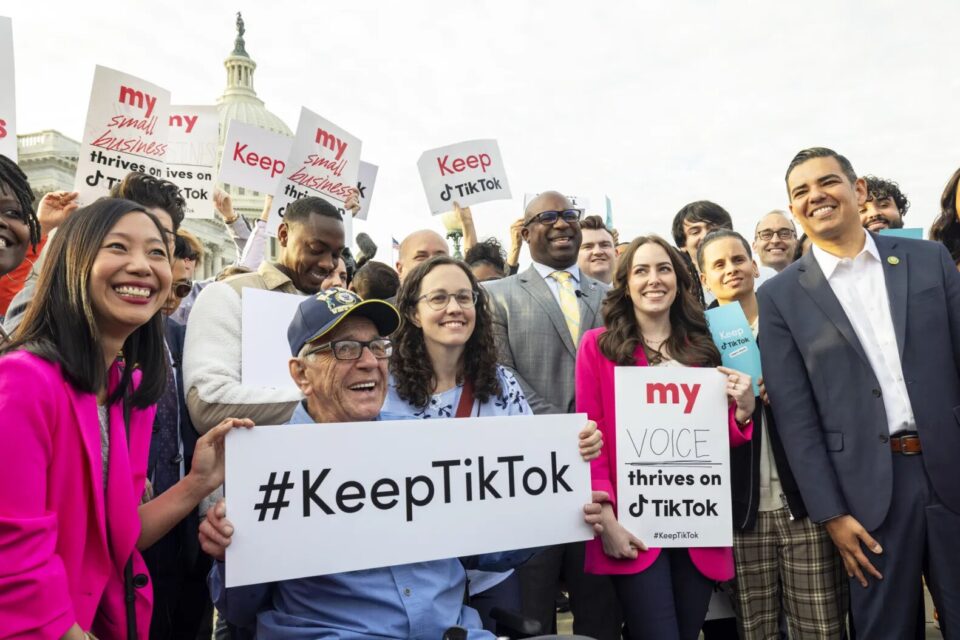TikTok Sues the United States
The social media giant is alleging that a potential ban signed into law last month violates the First Amendment rights of the platform and its users

Rep. Jamaal Bowman participates as TikTok content creators gather outside the Capitol to voice their opposition to a potential ban on the app, highlighting the platform's impact on their livelihoods and communities in Washington, D.C, on March 22, 2023. NATHAN POSNER/ANADOLU AGENCY/GETTY IMAGES
Social media giant TikTok has sued the U.S. government, alleging that recently signed legislation that could potentially ban the app violates the First Amendment rights of both the company and its users.
Last month, President Joe Biden signed a foreign aid package that included legislation requiring ByteDance — TikTok’s Chinese parent company — to sell the social media platform within 270 days or be banned from app stores and web-hosting services. The legislation would also create a process through which the president can designate other social media applications with ties to foreign governments as a national security risk and force divestment.
“Congress has taken the unprecedented step of expressly singling out and banning TikTok: a vibrant online forum for protected speech and expression used by 170 million Americans to create, share, and view videos over the Internet,” the company wrote in their Tuesday filing to the D.C. Circuit Court of Appeals.
“If Congress can do this, it can circumvent the First Amendment by invoking national security and ordering the publisher of any individual newspaper or website to sell to avoid being shut down. And for TikTok, any such divestiture would disconnect Americans from the rest of the global community on a platform devoted to shared content — an outcome fundamentally at odds with the Constitution’s commitment to both free speech and individual liberty.”
Under the Constitution’s First Amendment, Congress cannot outright ban the application in the U.S. without first proving that it poses an imminent national security risk. Lawmakers acknowledge this and contend that the proposed legislation is not an outright ban, but rather a narrow expansion of presidential authority to better regulate the influence of foreign governments in the tech sector.
TikTok contends that the government has not adequately outlined any national security “threat posed by TikTok nor explain why TikTok should be excluded from evaluation under the standards Congress concurrently imposed on every other platform,” and accused the government of operating on “hypothetical” concerns.
Those “hypotheticals” include lawmakers’ concerns that TikTok’s affiliations with China posed a cybersecurity risk to American users. In recent days, however, legislators have raised another reason for supporting the ban: the proliferation of pro-Palestinian content on the app amidst the ongoing war between Israel and Gaza.
Last Wednesday, the dark-money group No Labels held a webinar with prominent figures opposing student protests in support of Gaza. According to a recording of the meeting obtained by The Intercept, Rep. Mike Lawler (R-N.Y.) told attendees that the student protests were “exactly why we included the TikTok bill in the foreign supplemental aid package because you’re seeing how these kids are being manipulated by certain groups or entities or countries to foment hate on their behalf and really create a hostile environment here in the U.S.”
On Friday, Sen. Mitt Romney (R-Utah) said during a conference that while “some wonder why there was such overwhelming support for us to shut down potentially TikTok,” if “you look at the posting on TikTok and the number of Palestinians relative to other social media sites, its overwhelmingly so on TikTok.”
The public statements from lawmakers like Lawler and Romney could prove to be useful fodder for TikTok’s argument that the prospective ban on the application is an affront to the right to freedom of expression of its more than 150 million users.
From Rolling Stone US.







